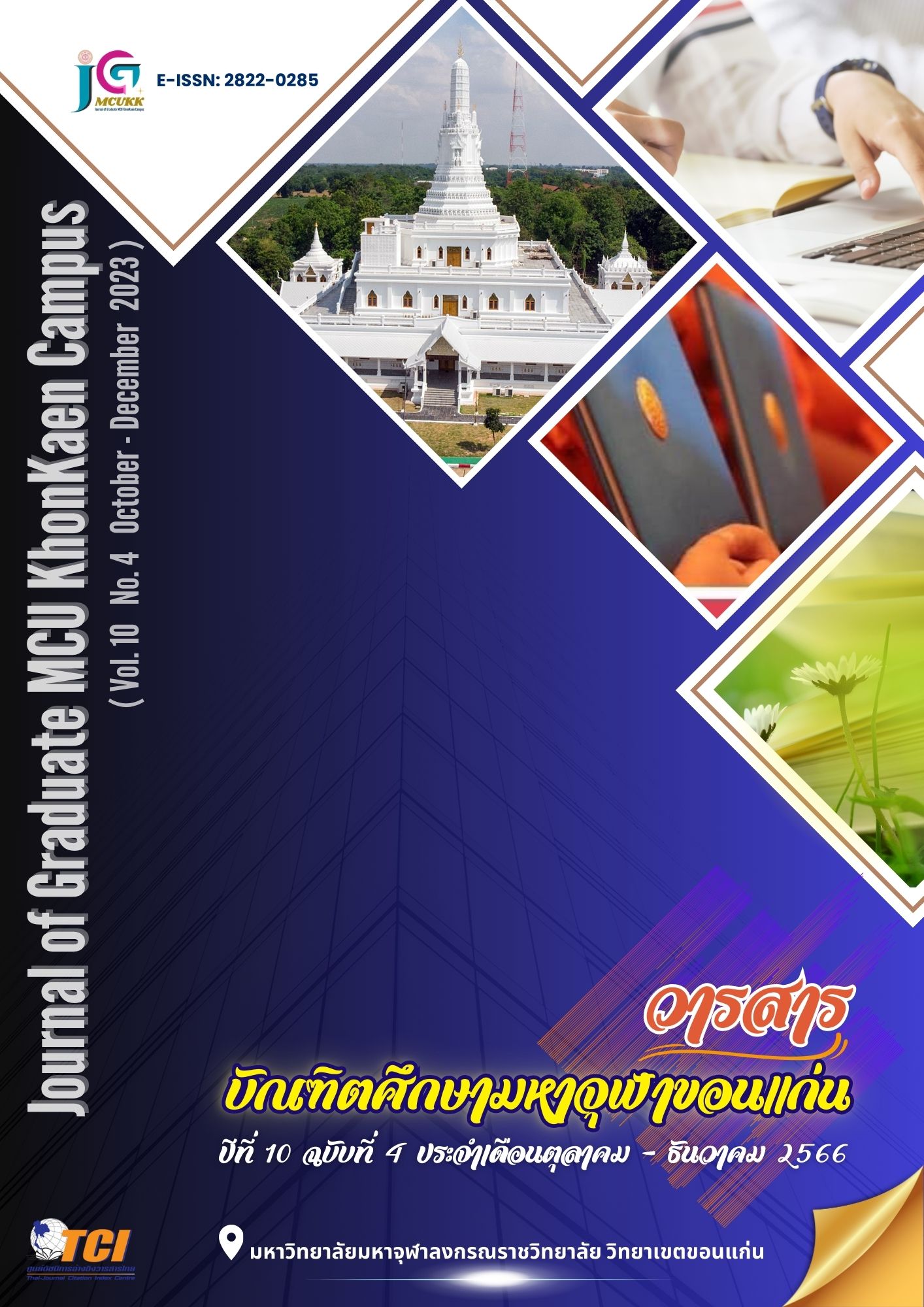Political information exposure behavior of Governance democracy of student of Maha Sarakham University.
Main Article Content
Abstract
The objectives of the research were to study the level of political information exposure behavior of governance democracy of the students of Maha Sarakhm University, to study the factors effecting the political information exposure behavior of governance democracy of the students of Mahasarakham University, and to present the application the principle of Dhamma to develop the political information exposure behavior of the students of Mahasarakham University. The research was the mixed method between the qualitative research and the quantitative one. The documentary research interviewed in depth 9 key informants whereas the quantitative research collected data with questionnaires of 388 samples. The data were analyzed with descriptive statistic.
The research found that
- The level of the political information exposure behavior of governance democracy of the students of MahaSarakham University overall was high and classified by side the factors were at high as follows: 1) respecting to the other’s rights, 2) equality, 3) following law, 4) accepting majority respectively.
- The comparison of the levels of the political information exposure behavior of governance democracy of the students of MahaSarakham University found that the students with different sex, residence, educations, faculties and income had different opinions.
- The results of presenting the political information exposure behavior of governance democracy of the students of MahaSarakham University applied to the principles of Buddhadhamm, namely, Saraniyadhamma were as follows: 1) Mettakayakamma, the leaders must live virtuous lives, try to restrain from physical evil actions, not oppress or torture the others by force in any manners, but always do right things, have loving-kindness, 2) Mettavacikamma, the leaders should acquire Piyavaca, i.e. pleasant and kindly speech, speak mild, polite and lovely words, speak only kind and useful words such as giving knowledge, advices, suggestions, and beneficial words and the truths, 3) Mettamanokamma, there are relations with kindness and goodwill. The leaders should think about only the good, useful and beneficial things to the others such as well wishing, wishing the others with happiness, success and prosperity. Intently wish to help the others, have loving-kindness, positive thinking and without envy, 4) Sadharanabhogi, there are fair sharing the profits or benefits, even for not many things, allotting the common interest among the members, fair using or consuming the common resources or interest together, sharing happiness or suffering of the same situations, 5) Sillimanite, there are behaving equally, behaving in moral conduct equally, having unity in moral or disciplinary practices, always practicing the same rules and regulations and respecting to the rights of the others and not intervening the duties of the others, 6) Ditthisamannata, there are having equality or unity in views, having the same opinions about the things, adjusting different visions, viewpoints and opinions to the same points, compromising different ideas, listening to the opinions of the others, being unselfish and not holding only self-opinions, having the equal opinions with those of the people in general, and practicing the duties sincerely and honestly
Article Details

This work is licensed under a Creative Commons Attribution-NonCommercial-NoDerivatives 4.0 International License.
References
นิลุบล ใจอ่อนน้อม. (2543). การเปิดรับข่าวสารทางการเมืองและการมีส่วนร่วมทางการเมืองของประชาชนในเขตกรุงเทพมหานคร. กรุงเทพฯ: จุฬาลงกรณ์มหาวิทยาลัย.
พระครูวินัยธรอธิษฐ์ สุวฑฺโฒ (สุขพานิช). (2565). การบูรณาการหลักพุทธธรรมเพื่อส่งเสริมวัฒนธรรมทางการเมืองในระบอบประชาธิปไตยของประชาชนในจังหวัดเพชรบุรี. วารสารพุทธสังคมวิทยาปริทรรศน์, 7(1), 46-63.
พระณัฐพงษ์ ณฏฺฐวํโส (สุดใจ). (2565). การกล่อมเกลาทางการเมืองในระบอบประชาธิปไตยของเยาวชนหนองฉาง จังหวัดอุทัยธานี. วารสาร มจร การพัฒนาสังคม, 7(2), 202-212.
พระปลัดวรรธนา ญาณวโร (สุวรรณเพ็ง). (2562). การจัดการเรียนรู้วิชาพระพุทธศาสนาของครูผู้สอนโดยใช้หลักสาราณียธรรม 6 ของโรงเรียนพระปริยัติธรรมแผนกสามัญศึกษา จังหวัดกาฬสินธุ์. วารสารบัณฑิตศึกษามหาจุฬาขอนแก่น, 6(4), 137-152.
พัชรภรณ์ เมธาจีรเวช. (2564). การเปิดรับข่าวสารทางการเมืองที่ส่งผลต่อการตัดสินใจออกมาเลือกตั้งของผู้มีสิทธิในเขตกรุงเทพมหานคร. (การค้นคว้าอิสระหลักสูตรนิเทศศาสตรมหาบัณฑิต). กรุงเทพฯ: มหาวิทยาลัยกรุงเทพ.
พิจิตรา มงคลศรีพิพัฒน์. (2560). พฤติกรรมการเปิดรับ และความพึงพอใจต่อสื่อประชาสัมพันธ์โครงการเที่ยวไทยเท่ กับพฤติกรรมการตัดสินใจท่องเที่ยวของนักท่องเที่ยวไทย. สืบค้นเมื่อ 11 กรกฎาคม 2566, จาก http://dspace.bu.ac.th/jspui/handle/123456789/2887
ศิริพงษ์ ทองจันทร์. (2561). พฤติกรรมการรับรู้ข้อมูลข่าวสารทางการเมืองผ่านสื่อออนไลน์ของประชาชนในจังหวัดมหาสารคาม. วารสารสถาบันวิจัยและพัฒนา มหาวิทยาลัยราชภัฏมหาสารคาม, 5(2), 213-226.
ศิริพัชรธิดา จิตวาทศิลป์ และ วัลลภ รัฐฉัตรานนท์. (2562). พฤติกรรมการรับรู้ข่าวสารทางการเมืองผ่านเครือข่าย สังคมออนไลน์ของประชาชนในเทศบาลเมืองปัตตานี. วารสารรัฐศาสตร์ปริทรรศน์ มหาวิทยาลัยเกษตรศาสตร์, 6(2), 49-62.
ศิริสุดา แสงทอง. (2565). การจัดสวัสดิการสังคมภาครัฐที่มีต่อแรงงานข้ามชาติในภาคเหนือตอนบน. วารสารพุทธสังคมวิทยาปริทรรศน์, 7(1), 29-45.
Silverman. D. (2000). Doing Qualitative Research: A Practical Handbook. London: Sange.
Yamane. Taro. (1967). Statistics : An Introductory Analysis. New York: Harpen and Row.

